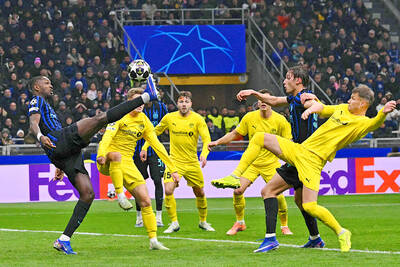Athletes traveling to the Beijing Winter Olympics were on Tuesday warned about speaking up on human rights issues while in China for their own safety by speakers at a seminar hosted by Human Rights Watch.
Rights groups have long criticized the International Olympic Committee (IOC) for awarding the Games to China, citing the treatment by the Chinese government of Uighurs and other Muslim minority groups, which the US has deemed “genocide.”
China denies the allegations of human rights abuses.
“There’s really not much protection that we believe is going to be afforded to athletes,” Global Athlete director-general Rob Koehler told the seminar. “Silence is complicity and that’s why we have concerns. So we’re advising athletes not to speak up. We want them to compete and use their voice when they get home.”
Rule 50 of the Olympic Charter stipulates: “No kind of demonstration or political, religious or racial propaganda is permitted in any Olympic site, venue or other area.”
“Chinese laws are very vague on the crimes that can be used to prosecute people’s free speech,” Human Rights Watch researcher Yaqiu Wang said. “People can be charged with picking quarrels or provoking trouble. There are all kinds of crimes that can be leveled at peaceful, critical comments.”
The US team is being shielded from questions about human rights, said Noah Hoffman, a cross-country skier who represented the US at the 2014 Sochi and 2018 Pyeongchang Winter Games.
“I feel fear for my teammates going to China,” Hoffman said. “I know my teammates are being shielded about questions on these issues for their own safety. We should never have to protect athletes from speaking out about issues that they think are really important.”
“My hope for athletes there is that they stay silent because they are not only going to be prosecuted by the Chinese authorities, but they could also be punished by the IOC,” Hoffman added.
Concerns about data privacy and spying at the Games were raised on Tuesday when a smartphone app built by China to monitor the health of attendees was reported to contain security flaws.
“When it comes to surveillance, we know it’s there,” Koehler said. “There are reasons that several countries have come out and asked athletes not to bring their own mobile devices. Any person of a sane mind who hears these things must have concerns.”
The IOC said in an e-mailed response to a request for comment that the Olympic body at all times “recognizes and upholds human rights as enshrined in both the fundamental principles of the Olympic Charter and in its code of ethics.”
The Winter Olympics begin on Feb. 4. Several countries, including the US, Britain, Japan and Australia, have announced diplomatic boycotts of the Games over concerns about human rights in China.

Fenerbahce on Thursday earned a rare 2-1 win in England, but were still knocked out of the UEFA Europa League by Nottingham Forest in the playoffs. Forest entered the second leg with a healthy 3-0 lead from the opener in Istanbul — where Vitor Pereira made an impact in his first game in charge — and that proved enough to advance to the round-of-16 with a 4-2 aggregate score. The result was a boost for Forest, struggling at 17th place in the Premier League, in their return to Europe after three decades. They next face Real Betis Balompie or Kerem Akturkoglu gave Fenerbahce

The Cleveland Cavaliers on Tuesday emphatically got back to winning ways in the NBA, coasting to a 109-94 victory over the New York Knicks as their recent star signing, James Harden, scored 20 points. The Cavs took the lead barely a minute into the game with an Evan Mobley three-pointer and never gave it up in a thoroughly comfortable night for the red-hot Ohio franchise. Former NBA Most Valuable Player (MVP) Harden, who was brought in from the Los Angeles Clippers this month, has never won a championship, despite being one of the most decorated players in the league. That was a key

LATE RALLY FAiLS: Jalen Duren led a late Detroit Pistons fightback, but it ultimately fizzled as a resolute San Antonio Spurs saw out the game Victor Wembanyama on Monday led a defensive masterclass as the San Antonio Spurs outmuscled the Detroit Pistons 114-103 in an intense and aggressive clash between the NBA’s two most in-form teams. Sitting second in the Western Conference, the Spurs were pushed hard for their ninth straight victory by the East-topping Pistons, who had entered the home court matchup on a five-game winning streak of their own. Defenses dominated the first meeting between the two sides this season, with Wembanyama making six blocks and 17 rebounds to fuel transitions as the Spurs pulled clear in the latter stages. While the Pistons’ shooting was at

HAT-TRICK: In the other games, Newcastle United and Leverkusen also advanced, as did Atletico Madrid, with Alexander Sorloth scoring three goals What a difference a year makes. Or nine months to be precise. Last season, Inter reached the UEFA Champions League final in style, with thrilling victories over Bayern Munich and Barcelona, but on Tuesday, the Italian giants limped out of the competition with a disappointing 2-1 loss at home to Bodo/Glimt — knocked out in the playoff round 5-2 on aggregate — in what is being labeled as one of the biggest upsets in Champions League history. It was not the first major upset the tiny Norwegian team have pulled off this season after wins over Manchester City and Atletico Madrid, and